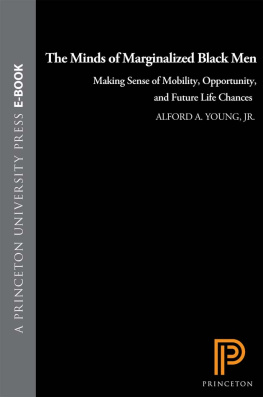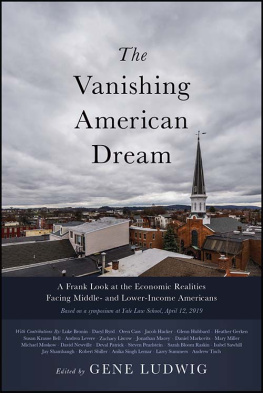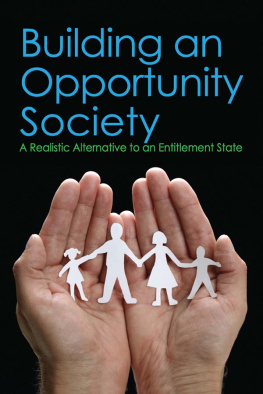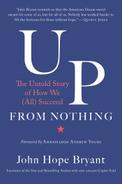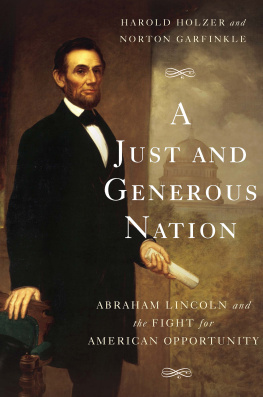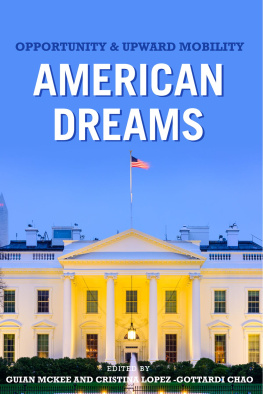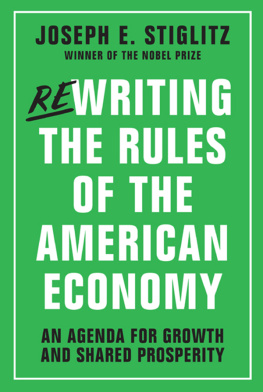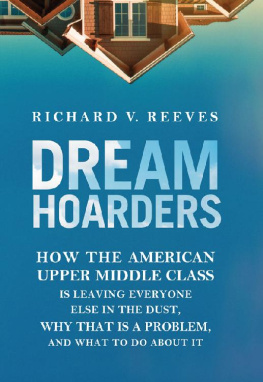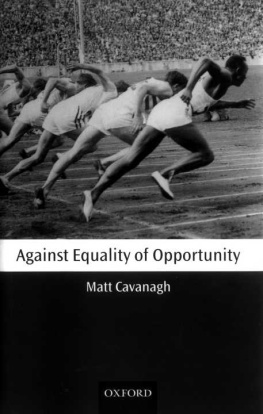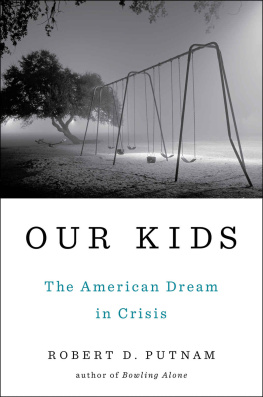Thank you for downloading this Simon & Schuster eBook.
Join our mailing list and get updates on new releases, deals, bonus content and other great books from Simon & Schuster.
C LICK H ERE T O S IGN U P
or visit us online to sign up at
eBookNews.SimonandSchuster.com
We hope you enjoyed reading this Simon & Schuster eBook.
Join our mailing list and get updates on new releases, deals, bonus content and other great books from Simon & Schuster.
C LICK H ERE T O S IGN U P
or visit us online to sign up at
eBookNews.SimonandSchuster.com
ALSO BY ROBERT D. PUTNAM
American Grace: How Religion Divides and Unites Us
(with David E. Campbell)
Better Together: Restoring the American Community
(with Lewis M. Feldstein)
Democracies in Flux: The Evolution of Social Capital in Contemporary Society
(editor)
Bowling Alone: The Collapse and Revival of American Community
Disaffected Democracies: Whats Troubling the Trilateral Countries?
(edited with Susan J. Pharr)
Making Democracy Work: Civic Traditions in Modern Italy
(with Robert Leonardi and Raffaella Y. Nanetti)
Double-edged Diplomacy: International Bargaining and Domestic Politics
(edited with Peter B. Evans and Harold K. Jacobson)
Hanging Together: Conflict and Cooperation in the Seven-Power Summits
(with Nicholas Bayne)
Bureaucrats and Politicians in Western Democracies
(with Joel D. Aberbach and Bert A. Rockman)
The Comparative Study of Political Elites
The Beliefs of Politicans: Ideology, Conflict, and Democracy in Britain and Italy

Simon & Schuster
1230 Avenue of the Americas
New York, NY 10020
www.SimonandSchuster.com
Copyright 2015 by Robert D. Putnam
All rights reserved, including the right to reproduce this book or portions thereof in any form whatsoever. For information address Simon & Schuster Subsidiary Rights Department, 1230 Avenue of the Americas, New York, NY 10020.
First Simon & Schuster hardcover edition March 2015
SIMON & SCHUSTER and colophon are registered trademarks of Simon & Schuster, Inc.
For information about special discounts for bulk purchases, please contact Simon & Schuster Special Sales at 1-866-506-1949 or .
The Simon & Schuster Speakers Bureau can bring authors to your live event. For more information or to book an event, contact the Simon & Schuster Speakers Bureau at 1-866-248-3049 or visit our website at www.simonspeakers.com.
Interior design by Ruth Lee-Mui
Jacket design by Christopher Lin
Jacket photogrpah Joseph Shields/Getty Images
Library of Congress Cataloging-in-Publication Data has been applied for.
ISBN 978-1-4767-6989-9
ISBN 978-1-4767-6991-2 (ebook)
Contents
Rosemary, for remembrance
Chapter 1
THE AMERICAN DREAM: MYTHS AND REALITIES
I went back to Ohio, but my city was gone.
If I can get to the heart of Dublin I can get to the heart of all the cities in the world.
In the particular is contained the universal.
MY HOMETOWN WAS, IN THE 1950s, a passable embodiment of the American Dream, a place that offered decent opportunity for all the kids in town, whatever their background. A half century later, however, life in Port Clinton, Ohio, is a split-screen American nightmare, a community in which kids from the wrong side of the tracks that bisect the town can barely imagine the future that awaits the kids from the right side of the tracks. And the story of Port Clinton turns out to be sadly typical of America. How this transformation happened, why it matters, and how we might begin to alter the cursed course of our society is the subject of this book.
The most rigorous economic and social history now available suggests that socioeconomic barriers in America (and in Port Clinton) in the 1950s were at their lowest ebb in more than a century: economic and educational expansion were high; income equality was relatively high; class segregation in neighborhoods and schools was low; class barriers to intermarriage and social intercourse were low; civic engagement and social solidarity were high; and opportunities for kids born in the lower echelon to scale the socioeconomic ladder were abundant.
Though small and not very diverse racially, Port Clinton in the 1950s was in all other respects a remarkably representative microcosm of America, demographically, economically, educationally, socially, and even politically. (Ottawa County, of which Port Clinton is county seat, is the bellwether county in the bellwether state of the United Statesthat is, the county whose election results have historically been closest to the national outcome.) The life stories of my high school classmates show that the opportunities open to Don and Libby, two poor white kids, and even to Jesse and Cheryl, two poor black kids, to rise on the basis of their own talents and energy were not so different from the opportunities open to Frank, the only real scion of privilege in our class.
No single town or city could possibly represent all of America, and Port Clinton in the 1950s was hardly paradise. As in the rest of America at the time, minorities in Port Clinton suffered serious discrimination and women were frequently marginalized, as we shall explore later in this chapter. Few of us, including me, would want to return there without major reforms. But social class was not a major constraint on opportunity.
When our gaze shifts to Port Clinton in the twenty-first century, however, the opportunities facing rich kids and poor kids todaykids like Chelsea and David, whom we shall also meet in this chapterare radically disparate. Port Clinton today is a place of stark class divisions, where (according to school officials) wealthy kids park BMW convertibles in the high school lot next to decrepit junkers that homeless classmates drive away each night to live in. The changes in Port Clinton that have led to growing numbers of kids, of all races and both genders, being denied the promise of the American Dreamchanges in economic circumstance, in family structure and parenting, in schools, and in neighborhoodsare surprisingly representative of America writ large. For exploring equality of opportunity, Port Clinton in 1959 is a good time and place to begin, because it reminds us of how far we have traveled away from the American Dream.
Family or not, the townspeople thought of all the graduates as our kids.
Don
Don was a soft-spoken white working-class kid, though no one in our class would have thought of him that way, for he was our star quarterback. His dad had only an eighth-grade education. To keep the family afloat, his dad worked two jobsthe first on the line at the Port Clinton Manufacturing factory, from 7:00 a.m. to 3:00 p.m., and the second, a short walk away, at the local canning plant, from 3:30 p.m. to 11:00 p.m. His mom, who had left school in the 11th grade, lived in the kitchen, Don says, making all of their meals from scratch. Every night, she sat down with Don and his two brothers for dinner. They got used to eating hash, made by frying up everything left in the house with potatoes. The boys were in bed by the time their dad got home from work.
They lived on the poorer side of town, and did not own a car or television until Don went off to college, by which time 80 percent of all American families already had a car, and 90 percent had a TV. Their neighbors drove them to church every week. The family had no money for vacations, but Dons parents owned their home and felt reasonably secure economically, and his dad was never unemployed. I didnt know that I was poor until I went to college and took Economics 101, Don recalls, and found out that I had been deprived.
Next page


